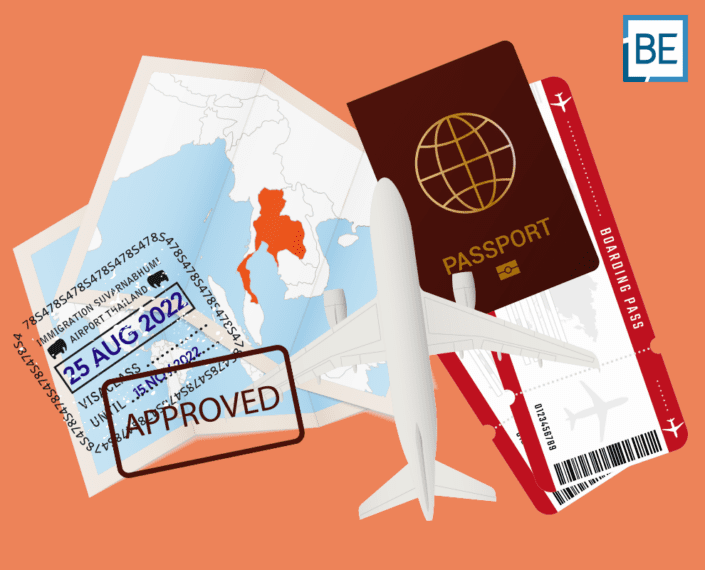legal
How to register a company in Thailand in 2024
27/03/2023
Thailand has been gaining recognition as a prime location for businesses to thrive in Southeast Asia. Its strategic location, well-connected transportation links, and vibrant startup ecosystem are just some of the reasons why entrepreneurs and investors are flocking to the Kingdom.
If you are wondering how to register a company in Thailand, this guide will provide the necessary information and steps to help you navigate the market successfully.
Key points
- Thailand is a strategic location for businesses to thrive in Southeast Asia due to its well-connected transportation links, vibrant startup ecosystem, and supportive government policies.
- Determining the right type of business is crucial in starting a business in Thailand, with most shareholders required to be Thai citizens.
- Foreign companies are prohibited from conducting certain activities in Thailand, according to the Foreign Business Act 1999.
- The Board of Investment (BOI) provides incentives and benefits to promote investments in Thailand.
- Obtaining a Non-Immigrant ‘B’ or Business Visa + Work Permit or applying for the SMART Visa Program is necessary to work in Thailand legally.
Pick the Right Type of Business
The first step in starting a business in Thailand is determining the type of company you want to establish. It is important to note that unless the company is part of a Board of Investment (BOI) program, most shareholders must be Thai, while foreigners can own a maximum of 49% of the company. However, this minority percentage of ownership may be exempted if your business is not restricted under the Foreign Business Act or receives a Foreign Business License (FBL), which is generally granted to foreign-owned businesses that do not compete directly with Thai businesses.
Check Out Thailand’s Foreign Business Act
Understanding the activities foreign companies are prohibited from conducting in Thailand is also crucial. The Foreign Business Act states which businesses are prohibited, which need approval from related government agencies, and which do not require special permission before starting a business in Thailand. Check out the full list of activities before making any business decisions.
For more information about the Foreign Business Act, please see More info about Foreign Business-act.
Learn About Incentives and Benefits Provided by the BOI
The BOI offers various incentives and benefits to promote investments in Thailand. If your business meets the criteria, apply for the BOI. Tax incentives include exemption of corporate income tax for up to 13 years (depending on the company’s activities and other conditions), a 50 percent reduction in corporate income tax for five years (only in special investment promotion zones), and exemption of import duties on raw or essential materials used in research and development purposes, among others. Meanwhile, non-tax incentives include 100% foreign ownership (except for specific activities and industries), the permit to own land, and the permit to bring in skilled workers and experts to work in Thailand.
Apply for Visa and Work Permits
You will need a Non-Immigrant ‘B’ or Business Visa to work in Thailand legally and a Work Permit. Application for this type of visa can be submitted at a Royal Thai Embassy or consulate in your country of origin. Once in Thailand, you can apply for a Work Permit and extend the visa.
Alternatively, consider the SMART Visa Program, a new type of visa targeted at investors, skilled individuals, and startup entrepreneurs wishing to work or invest in certain industries. This visa allows holders to stay in the country for a maximum of four years, exempting them from work permit requirements and providing other privileges.
To apply for a SMART visa, you must match the criteria specified by the office of the BOI.
Register Your Company
The first step to registering a company in Thailand is reserving a company name online with the Department of Business Development. Afterward, prepare the necessary documents, including the Memorandum of Association, application form and list of shareholders, director forms signed by each director of the company, Declaration of Business Operation form, and the details of the offices and branches of your business. Register the company at the business registration office in the area where the company is located, and obtain the taxpayer identification number for your company.
Open a Bank Account
Opening a corporate bank account in Thailand is relatively simple; please note that the company Director must visit the bank physically.
Step 1: prepare the required documents listed above and any additional documents the bank may request.
Step 2: Complete the bank’s application form
Step 3: Visit the local bank to submit the documents and meet with the manager at the bank’s local branch.
Typically the process for opening the account takes approximately one week.
The following will be required for opening a corporate bank account:
- Copy of the company’s registration certificate
- Stamped minutes of the board of directors meeting authorizing the opening of the account and designating the signatories for payments and closure of the account
- The tax ID card of the company
- ID card or passport of every member of the board of directors and shareholder who holds more than 25%
- Copy of the articles of association and memorandum of association
- Shareholder’s list
- A minimum deposit of THB 500 (may differ between banks)
Please be aware that the following additional documents may be required:
- a work permit,
- company records,
- tax details and
- personal financial information
After setting up a company in thailand, Remember to Pay Taxes
In Thailand, businesses must pay Corporate Income Tax (CIT) and submit their tax returns (Form CIT 50) within 150 days from the end of their accounting period, according to the Revenue Department. There are various types of deductible expenses, and the CIT rate is 20% of net profit, which may differ depending on the type of taxpayer. VAT filings and WHT tax filings shall be done monthly.
Understanding the Thai Language and Culture is Crucial
To succeed in your business, it is important to have at least a basic understanding of the Thai language and culture. The Center of Thai as a Foreign Language (CTFL) at Chulalongkorn University provides language, social, and cultural courses for foreigners. Alternatively, having a trustworthy Thai business partner can help you overcome language barriers.
Connect with the Right Organizations to Boost Your Business
Chambers of Commerce support and promote businesses within a particular area or industry. Some advantages of chambers of commerce include:
- Networking Opportunities: Chambers of commerce provide a platform for businesses to meet and connect with each other, exchange ideas, and collaborate on projects. This networking can lead to new business partnerships and opportunities.
- Advocacy: Chambers of commerce represent the interests of businesses to local and national government officials, advocating for policies and regulations that benefit their members. They can also provide legal and regulatory advice to members.
- Marketing and Promotion: Chambers of commerce promote their members and businesses through events, social media, and other marketing channels. This can lead to increased visibility and business opportunities.
- Access to Resources: Chambers of commerce often provide resources and training to their members, such as educational workshops, mentorship programs, and business support services. This can help businesses improve their operations and competitiveness.
- Community Involvement: Chambers of commerce are often involved in community events and projects, which can help businesses develop a positive reputation in the community and strengthen their relationships with local residents and organizations.
Co-Working Spaces and Office Space
Co-working spaces are an excellent option for those who want to start small. Bangkok has numerous co-working spaces that offer different plans, including access to meeting rooms, printers, copiers, and event spaces.
True Digital Park is the largest startup ecosystem in Southeast Asia that offers multi-functional spaces for work, innovation, events, and leisure.
WeWork is an international co-working space quickly gaining popularity among startups in Bangkok.
There are many other examples which could be beneficial to your company such as Regus etc.
How can Belaws help?
You can talk directly to one of our experts for more information about starting a company in Thailand.
This article is for information purposes only and does not constitute legal advice.
Our consultations last for a period of up to 1 hour and are conducted by expert Lawyers who are fluent in English, French and Thai.
Consultations can be hosted via WhatsApp or Video Conferencing software for your convenience. A consultation with one of our legal experts is undoubtedly the best way to get all the information you need and answer any questions you may have about your new business or project.
USD 150
Up to 1 hour
Online payment (Paypal or Credit card)
Legal consultation can be conducted in English, French or Thai
Legal consultations are handled by experienced lawyers from the relevant fields of practice
Frequently asked questions
Can a foreigner start a business in Thailand?
Yes, a foreigner can start a business in Thailand, but there are certain restrictions and regulations that must be followed.
How much does it cost to start a business in Thailand?
The cost of starting a business in Thailand depends on the type of business and its location. However, the costs can range from THB 15,000 to THB 30,000.
Can foreigners own 100% of a business in Thailand?
Foreigners cannot own 100% of a business in Thailand unless it is part of a Board of Investment (BOI) program or is exempted under the Foreign Business Act.
Is it hard to start a business in Thailand?
Starting a business in Thailand can be challenging due to the regulations and restrictions that must be followed, such as the requirement for Thai shareholders and limitations on foreign ownership.
What is a good salary in Thailand?
A good salary in Thailand depends on various factors such as location, industry, and experience. However, the average monthly salary in Thailand is around THB 26,000.
Is Thailand a good place to start a business?
Yes, Thailand is a good place to start a business due to its strategic location, well-connected transportation links, vibrant startup ecosystem, and supportive government policies.
What are the most profitable business in Thailand?
The most profitable businesses in Thailand include tourism, food and beverage, real estate, and e-commerce.
How much is Thai tax for business?
Businesses in Thailand must pay Corporate Income Tax (CIT), which is 20% of net profit, and Value-Added Tax (VAT). The VAT rate is currently 7%.
Can a foreigner buy a franchise in Thailand?
Yes, a foreigner can buy a franchise in Thailand, but there may be restrictions and regulations that must be followed.
What is company tax in Thailand for foreigners?
The company tax rate in Thailand is the same for both foreigners and Thai citizens, which is 20% of net profit.
Can I work self employed in Thailand?
Yes, a foreigner can work as a self-employed individual in Thailand, but they must have a Non-Immigrant ‘B’ or Business Visa and a Work Permit.
How many days can I stay in Thailand on a business visa?
The Non-Immigrant ‘B’ or Business Visa allows a foreigner to stay in Thailand for up to 90 days. The visa can be extended for an additional 90 days, but a Work Permit must be obtained first.
Related articles
Subscribe today
Subscribe today
To our newsletter for all the latest legal news
in South East Asia, Belaws updates and
special promotions on our services.
To our newsletter today for all the latest legal news in South East Asia,
Belaws updates and special promotions on our services.







